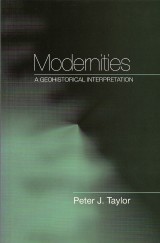Details

Modernities
A Geohistorical Interpretation1. Aufl.
|
16,99 € |
|
| Verlag: | Wiley |
| Format: | EPUB |
| Veröffentl.: | 02.05.2013 |
| ISBN/EAN: | 9780745668741 |
| Sprache: | englisch |
| Anzahl Seiten: | 168 |
DRM-geschütztes eBook, Sie benötigen z.B. Adobe Digital Editions und eine Adobe ID zum Lesen.
Beschreibungen
Taylor develops a geohistorical argument which focuses on the periods and places of modernities, offering a grounded analysis of what it is to be modern. He identifies three 'prime modernities' which have defined the development of our modern world: today's consumer modernity preceded by the industrial modernity of the nineteenth century which was itself preceded by mercantile modernity.
Preface. <p>Prologue: Being Geohistorical.</p> <p>Who's Modern?.</p> <p><b>1. Modern, --ity, --ism, --ization:</b>.</p> <p>Ambiguous to the core.</p> <p>Social theory with smoke in its eyes.</p> <p><b>2. Prime Modernities:</b>.</p> <p>Multiple moderns versus multiple modernities.</p> <p>Consensus and coercion in the projection of hegemonic power.</p> <p><b>3. Ordinary Modernity:</b> .</p> <p>Cultural celebrations of the ordinariness.</p> <p>Feeling comfortable: the modern home.</p> <p>Suburbia: the domestic landscape of consumer modernity.</p> <p>Not modernism.</p> <p><b>4. Modern States:</b> .</p> <p>Inter-stateness.</p> <p>Absolutism as a political way of life.</p> <p>Going Dutch.</p> <p>The changing nature of territoriality.</p> <p><b>5. Political Movements:</b> .</p> <p>Parties and movements.</p> <p>Movements and modernities.</p> <p>Socialism against the modernity that Britain built.</p> <p>Environmentalism against the modernity that America built.</p> <p><b>r 6. Geographical Tensions:</b>.</p> <p>Where and what?.</p> <p>Place-space tensions.</p> <p>Nation-state as enabling place and dis-enabling space.</p> <p>Home-household as enabling place and dis-enabling space.</p> <p><b>7. Americanization:</b>.</p> <p>Incipient, capacious and resonant Americanizations.</p> <p>Inside America: conditions for constructing a modernity.</p> <p>Outside America: seeing the most modern of the modern.</p> <p>Americanization and globalization.</p> <p>Epilogue.</p> <p>Presents and Ends.</p> <p>System logic: the extraordinary effect of ordinary modernity.</p> <p>Political practice: the post-traditional challenge.</p> <p>References.</p> <p>Index.</p>
"This book reaches across disciplines, across countries and across ideologies, developing along the way a stimulating and original perspective on the making of the modern world." <i>Nigel Thrift, University of Bristol</i><br /> <p><i>"Modernities</i> is short, sensible, clear and reflective. It raises in an intelligent way the questions with which we all must deal. It is a book well worth reading." <i>Immanuel Wallerstein, Binghamton University</i><br /> </p> <p>"<i>Modernities</i> is to be recommended. It is highly accessible and presents complex ideas in a clear and entertaining fashion. It will interest proponents and opponents of modern thought, and would find much favour amongst sociologists, geographers and students of the social sciences more generally. The book highlights the continued importance of geographical approaches to the study of the rich and varied histories and geographies of modernity."<i>Mark Banks, Manchester Metropolitan University, Sociological Research Online</i></p>
<b>Peter Taylor</b> is Professor of Geography at Loughborough University.
"Modern", "modernity", "modernism", "modernization": these notions convey an important cluster of ideas which aim to describe the world in which we live. But the premises underlying these ideas are becoming outdated. They tend to assume a link between modernity and industrialism which can no longer be sustained. The author moves beyond these limitations by proposing a world of multiple modernities of which industrial modernity is but one. <p>Taylor develops a geohistorical argument which focuses on the periods and places of modernities, offering a grounded analysis of what it is to be modern. He identifies three "prime modernities" which have defined the development of our modern world: today's consumer modernity preceded by the industrial modernity of the nineteenth century which was itself preceded by mercantile modernity. In each case one particular country is implicated in the creation of the new modernity, first the Dutch Republic in the seventeenth century, followed by the British industrial revolution, and finally Americanization in our times, sometimes known as the consumer revolution. Using this geohistorical framework of multiple modernities, old conundrums seem much less difficult: the rapid demise of the USSR, the growth of suburbia, the erosion of the state, the rise of environmentalism, the ambiguity of home life, the emergency of McWorld, and the threat of globalization are all brought into new focus. But one critical question remains. Is the Earth big enough for the creation of a modern global society to satisfy us all?</p> <p>This concise and wide-ranging book will be essential reading for students of human geography, historical geography, sociology and social theory, and it will be of interest to anyone concerned with the debate about modernity and postmodernity.</p>
Diese Produkte könnten Sie auch interessieren:

Observing Systems for Atmospheric Composition

von: Guido Visconti, Pietro Di Carlo, W. Brune, M. Schoeberl, Andreas Wahner

149,79 €















